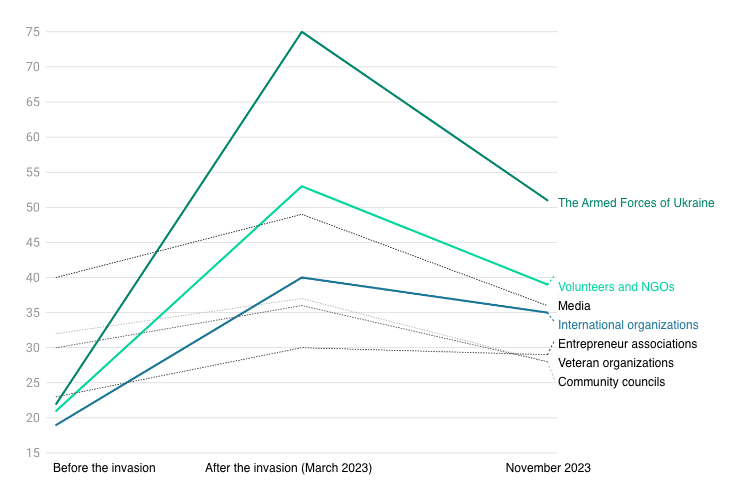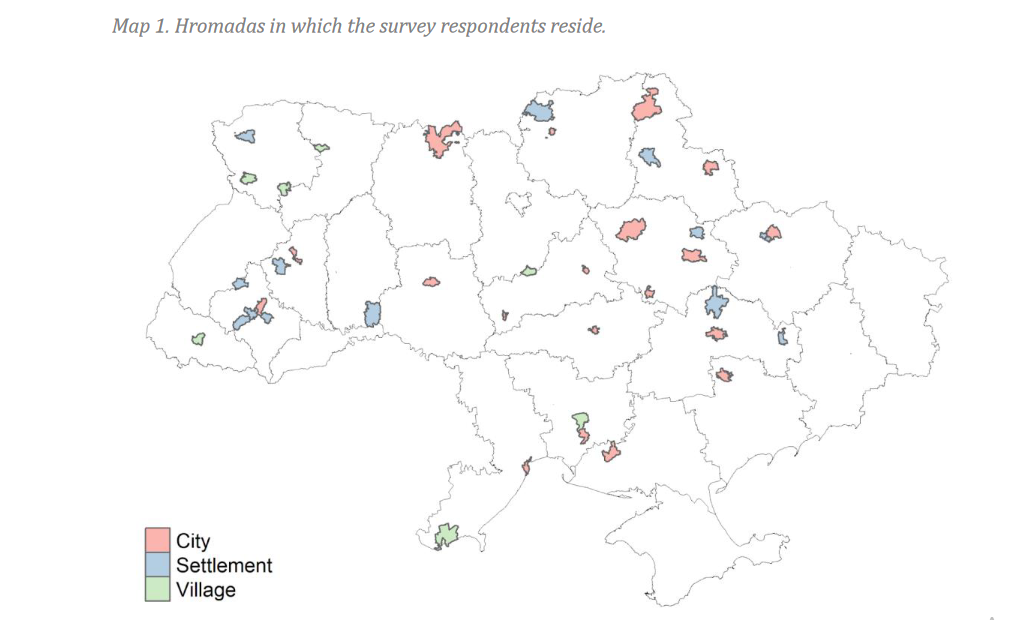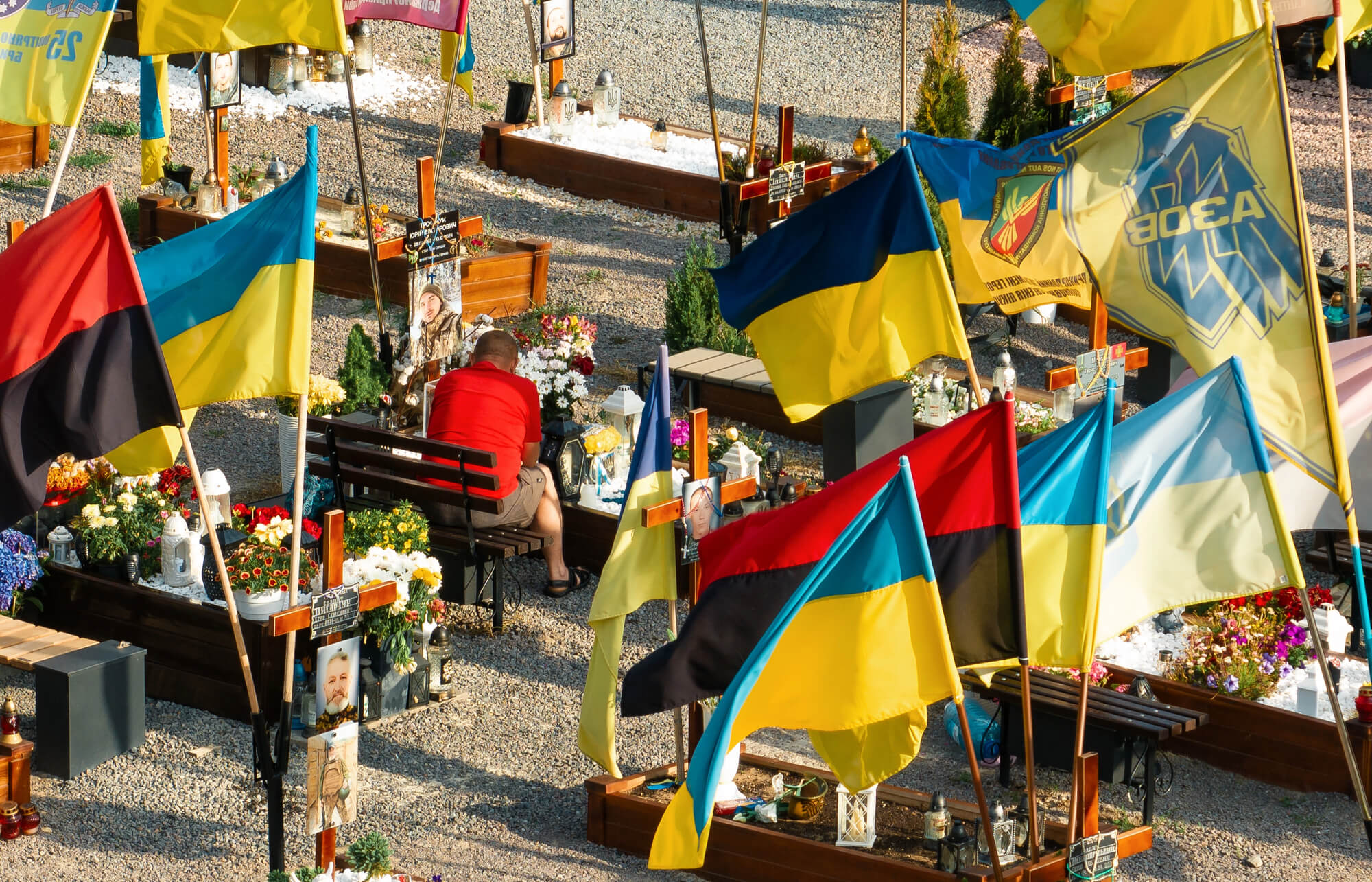The full-scale Russian invasion pushed local self-government (LSG) to actively cooperate with various actors, including civil society organizations. In the previous survey wave conducted in March 2023, we observed that local authorities partially retained trust despite worsening economic conditions in communities and questionable decisions regarding budget allocations. We implemented the second wave of the survey in November 2023.
How intense is today’s cooperation and trust between authorities and civil activists, and what has changed at the beginning of 2024? What prevents citizens from effectively engaging with local authorities? How are these challenges related to community cohesion? These are the main questions we address.
This research is based on a survey of civil activists implemented in November 2023. More details about the study design can be found in the previous publication, where we described the results of the first wave of the survey of activists or in the full English version of the report. Both survey waves were conducted within a joint project between the Center for Sociological Research, Decentralization, and Regional Development at the KSE Institute and the London School of Economics and Political Science under the PeaceRep program.
Trust in local authorities
Trust in both local and central authorities is shaped by different factors (Jennings, 1998). Citizens assess central government bodies in terms of economic efficiency, namely the quality of public services provided (Jennings, 1998) and satisfaction with the state of the economy (Nye, 1997). On the other hand, they expect local government bodies to prioritize accountability, transparency, and quality representation of residents’ interests (Jennings, 1998). More details about the nature of trust were discussed in our study based on the first wave of surveys.
In 2023, societal trust in community heads decreased from 63% to 48%, and confidence in local councils decreased from 58% to 44%. Notably, in January 2024, trust fell below the level of 2021 for the first time since the full-scale invasion (see Figure 1).
Figure 1. Dynamics of trust in government Institutions
Source: Razumkov Center survey
The survey results highlight several significant obstacles that hinder respondents’ cooperation with local authorities. Apart from the most obvious reason - the lack of time due to job, family, or other commitments, 19% lacked trust in the local government, while another 14% reported having had a negative experience dealing with it. Thus, mentions of distrust in local authorities and unsuccessful past cooperation experiences constitute a third of all responses. A lack of time for civic engagement is in the second place (29%).
Figure 2. Factors hindering activists' interaction with local authorities
Note: Only activists who have not interacted with local authorities in the last six months answered this question. Respondents could select only one answer.
Fifteen percent of respondents indicated that they find it difficult to interact with local authorities. Ten percent said the process was too complex, while another five percent stated that they do not understand the procedures associated with it. Only 14 percent reported that they do not encounter significant problems when interacting with local self-government.
The dynamics of cooperation between local self-government and other entities during wartime
At the beginning of the full-scale invasion, cooperation between LSG and the Armed Forces of Ukraine, territorial defense volunteer units (TDVUs), as well as security and law enforcement agencies intensified significantly. A similar trend was observed in cooperation with civil and international organizations, and research by the Center for Innovations Development showed that collaboration between residents and LSG had strengthened during the war.
However, by the end of 2023, the level of cooperation between LSG and other entities noticeably declined.
Figure 3. Percentage of activists rating the cooperation of local self-government bodies with various institutions as "systematic"
Note: Respondents could choose one of the following options: systematic cooperation, situational cooperation, no cooperation, conflict or competition, or don't know / cannot answer. Respondents evaluated cooperation before the invasion retrospectively in the first survey wave in March 2023.
Despite this decline, the level of cooperation still remains higher than before the full-scale invasion. Local authorities continue to actively cooperate with international organizations, attracting financial assistance for community recovery and reconstruction. The level of cooperation with these types of actors and with veteran organizations has hardly decreased over the past six months. This may be related to re-formatting of LSG cooperation into a more systematic and project-based approach, whereas in 2022, local authorities had to involve all available actors. Another reason could be the changing nature of war shocks and the availability of resources to deal with them among different actors - while LSG coped with the initial shocks together with volunteers, involving major donor funds became a better option for implementing large projects such as reconstruction or support of veterans.
Potential reasons for the decline in trust and cooperation
What factors can influence the overall trend of decreasing cooperation and trust towards local authorities, and how have they changed over the past six months?ʼ
Barriers to participation in decision-making
According to the Civic Engagement Poll conducted by USAID/ENGAGE in August 2023, Ukrainians are more engaged in activities within their communities than in civil society organizations: 53% of Ukrainians are involved in community activities. About a third actively utilize various mechanisms of democratic participation, the most popular of which are creating and signing electronic petitions to local self-government bodies and state authorities and initiating various collective initiatives (such as building associations and chats, volunteer groups, etc.).
Our survey shows that a significant share of activists encounter obstacles to participation in decision-making in their communities. In 30 out of 40 communities, respondents faced restrictions on citizen participation in decision-making at the local level. Among them, half noted that these barriers were deliberately created by local authorities rather than were a consequence of martial law.
Figure 4. Are there restrictions imposed by local authorities on citizens' participation in decision-making at the local level?
Respondents complain that authorities make decisions without involving citizens, leaving them feeling powerless and deprived of influence. In open-ended questions, they mention the following problems of local democracy in their communities:
- The authorities' closed-off stance towards citizens;
- Lack of consultation by local authorities with residents on important community issues;
- Restricted access to local council meetings;
- Limited access to information about the activities and decisions of LSG;
- Insufficient information about LSG projects and decisions;
- Blocked participation tools;
- Ignoring citizens' appeals and refusal to meet with citizens by local council deputies and LSG leadership;
- Ban on holding mass gatherings and protests;
- Pressure from local authorities on protest participants;
- Inflated number of signatures required for consideration of electronic petitions and their closure without response (the number of votes and the deadline for consideration of local petitions are determined by local councils);
- Inactive community councils under LSG.
Reconstruction efforts have started in 28 communities from our sample, and in six of them, activists have personally encountered restrictions on community participation in recovery processes.
Respondents cited a lack of funding as the main problem, resulting in minimal reconstruction efforts in the community. The authorities do not want to involve the public in this discussion. Activists believe allocating funds for reconstruction projects is not effective and transparent enough. They also mention corruption cases, such as awarding reconstruction projects to affiliated companies without proper tenders or restricting access to tender participation. Additionally, activists note that regulation and excessive formal requirements complicate citizen participation in recovery processes.
Difficulties with access to information
The survey revealed that many activists find it difficult to access necessary information or data due to restrictions imposed by local authorities. Twenty-seven percent of respondents reported difficulties obtaining essential information (in 20 out of 40 communities), while 36% stated they encountered no obstacles.
Figure 5. Have you encountered difficulties accessing the information or data you need due to restrictions imposed by local authorities?
The activists in our panel often encounter obstacles when attempting to access public information, sometimes resorting to courtrooms to obtain it. Some information on local council websites is either missing or blocked due to wartime restrictions.
The second most commonly cited obstacle is ignoring requests submitted in accordance with the Law "On Access to Public Information," with delays in providing information being a widespread issue. Additionally, the information provided is often incomplete or inaccurate. Activists also mention receiving formal responses that do not adequately address their questions.
Another problem is the lack of accountability by some local government bodies, which do not report on their activities nor publish decisions made by the executive committee. Difficulties with community websites are often mentioned because finding the necessary information can be challenging, and these websites are frequently inaccessible to people with hearing or visual impairments. Additionally, activists mention the ban on broadcasting council session meetings and restrictions on journalists' and citizens' access to them.
The impact of restrictions on social cohesion
The above restrictions pose a threat to community cohesion. The survey indicates that the presence of these restrictions is associated with activists' perceptions of the likelihood of protests. For instance, 45% of respondents who noted limitations on participation in decision-making believe that protests in their community are probable. Among those who encountered difficulties accessing information due to restrictions from local authorities, 66% consider protests likely. The most concern arises from restrictions on participation in reconstruction processes: 67% of respondents aware of such limitations anticipate potential protests.
Figure 6. Protest sentiments by types of communities
These results underscore the negative impact of restrictions imposed by local authorities on social cohesion. When citizens feel excluded from the decision-making process and lack access to necessary information, their trust in local government diminishes. Depriving residents of the right to voice and influence may lead to increased tension and a greater likelihood of protests, undermining the stability and collective capacities necessary for effective governance and community recovery.
Figure 7. Protest sentiments depending on restrictions on citizen participation in decision-making
Conclusions
In 2023, social trust in community leaders decreased from 63% to 48%, and confidence in local councils dropped from 58% to 44%. Importantly, trust as of January 2024 has fallen below the level of 2021, prior to the full-scale invasion.
At the onset of the invasion, cooperation between local government, Ukrainian Army, and international organizations sharply increased and remained higher than before the invasion. However, many respondents encounter obstacles in interacting with local authorities due to significant distrust and previous negative experiences. In 30 out of 40 surveyed communities, residents face challenges in engagement, such as opaque decision-making by local authorities and limitations on mechanisms of democratic participation.
Activists report problems with funding, corruption, and excessive regulation, which hinder effective participation in recovery efforts. Access to public information is challenging too, with ignored requests, delays, and incomplete responses being common issues.
This limits social cohesion, increases societal discontent, and reduces trust in local authorities, thereby undermining effective governance and community recovery efforts. However, trust and social cohesion are key factors in communities' resilience to the shocks of war.
We advise local authorities to adopt practices of engagement that align with the realities of the wartime situation, as seen in communities in the Kharkiv region or Lutsk.
At the onset of the invasion, activists partially assumed governmental functions. In communities most affected by the shocks of war, they handled evacuations, assisted those who remained, and ensured safety. Due to the shocks which local authorities could not handle alone, they became more open. After stabilizing the situation in communities, the LSG capacity partially recovered, and the role of accountability to residents increased again. However, authorities are not prepared for greater collaboration with citizens because they were very closed even before the full-scale invasion. They view active collaboration with activists in 2022 as a forced step rather than a new practice. Unfortunately, this logic of local leaders limits the capacity of communities, which is enhanced by collaboration with all possible actors, especially in a situation when most challenges of war are still present.
The impossibility of holding any elections during martial law highlights the need to engage the community in public discussions on important decisions so that residents feel their impact on community life. Particularly important is the discussion of reconstruction projects and the allocation of funds to the Armed Forces of Ukraine, which will become possible if the respective draft law is adopted.
Appendix
Map 1. Communities where survey respondents reside
Editor: Myroslava Savisko
Attention
The authors do not work for, consult to, own shares in or receive funding from any company or organization that would benefit from this article, and have no relevant affiliations






